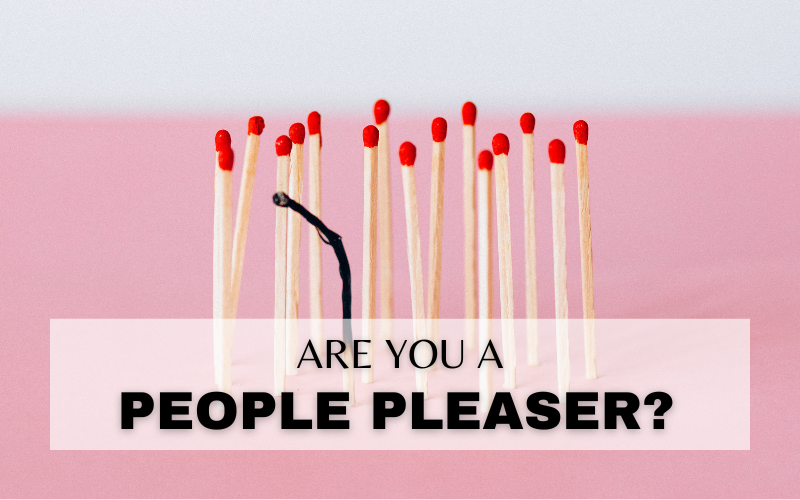Listen to the article (6:14 minutes)
Disclaimer – The information in this article is meant for entertainment purposes only and is in no way meant as a replacement for professional medical or psychological support. Please seek the appropriate advice from a healthcare professional should you feel it necessary.
In my last post, I said that I would discuss my top tips for managing stress and overthinking. However, as I sat down to write, I realised that I’d already done it!
So, if you are waiting for that information, you can read/listen to it here.
As I no longer need to spend time on that topic, I thought I’d write about a common subject that often comes up in both my coaching and workshops; people pleasing.
Full disclosure here; I’m a recovering people pleaser. So this topic is another that’s close to my heart!
How People Pleasing Manifests
People-pleasing often looks like:
- Trying to make others happy at the detriment of oneself
- Trouble setting boundaries
- Inability to stand up for oneself
- Consistently putting other’s needs first
- Deferring to others
- Inability to say ‘no’
- Feeling exhausted and unappreciated
- Thinking that no matter what you do for others, it’s never enough or good enough
For many people, this behaviour is their default. For others, it can occur only in conflict/potential conflict or high-stress situations.
How we are Programmed
It’s probably important to point out here that we learn our thoughts, behaviours and reactions predominantly up to the age of seven. At that age, brain functioning changes significantly, and we can get stuck in the same way of thinking and behaving for the rest of our lives.
So, if you see someone acting childishly and you think to yourself, ‘How old are they, six?’, that may well be the emotional age at which that behaviour stuck. Of course, we can change behaviours in adulthood; however, we have to do it consciously.
How People Pleasing Begins
People-pleasing often starts with parent pleasing
Typically, as children, we learn how to think, behave and react in two different ways:
1. Copying a parent or primary caregiver
We are programmed by watching and copying what we see our parents and primary caregivers say and do. They are our role models for what is right and wrong. When we are young, we don’t have any other references.
Therefore, if you have a parent whom people pleases, and you strongly identify with them, there’s a significant chance that you, too, will adopt those same behaviours.
2. By trial and error
By trial and error, I mean trying a particular behaviour and either liking or disliking the response. If we get a favourable return on something we say or do, we’ll likely repeat it. However, if we don’t, we may try it a few more times, but ultimately abandon it.
People Pleasing = Fawning
Last week, I wrote about the flight/fight/freeze response. If you missed it, you can read it here. In the article, I mentioned that ‘fawning’ is a little-discussed reaction many of us have towards stressful conflict situations instead of or in addition to the more common running, fighting or freezing.
As I’ve mentioned in many of my articles, our subconscious mind is ALWAYS scanning our environments for real or perceived threats. Unfortunately, our brains can’t tell the difference between the two.
To children, unconsciously perceived threats can look like parents who are emotionally unavailable typically because they are:
- Sad, depressed, anxious, overwhelmed, preoccupied, stressed, etc.
- Distracted
- Overly demanding
- Aggressive, angry, overbearing, controlling
- ‘Helicopter’ parenting
As children, we are 100% dependent on our parents for all our physical and emotional needs. Therefore, maintaining a good relationship with them is critical to our survival. To this end, a child may develop parent-pleasing behaviours as an adaptive way to meet their unmet needs.
Example
A child who has emotionally unavailable parents may subconsciously think, ‘If I’m a good boy/girl…
- I’ll get praise/validation/love/attention
- The people important to me will like me
- I’ll avoid being physically or emotionally hurt
- I’ll avoid someone I love being physically or emotionally hurt
- I will get my emotional and physical needs met
However, what is a brilliant adaptive tool in childhood, becomes maladaptive in adulthood.
In the next post, I’ll discuss more on how people pleasing affects us in adulthood, plus some of my most effective tools for managing and overcoming it.
In the meantime, I realise that this is another difficult topic. So, if you felt triggered by anything you read here, please seek professional support or talk to someone whom you trust. You can also contact me for a 15-minute discovery call at jo@jobanks.net.



